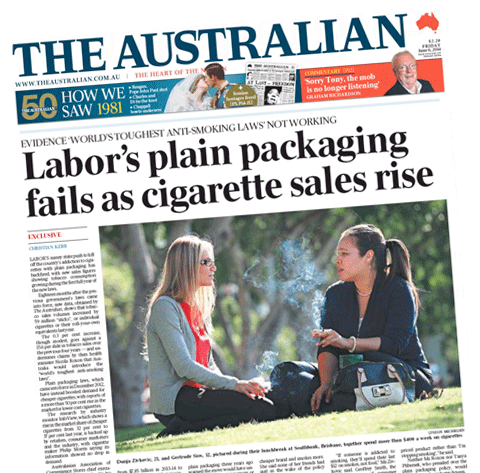Ireland’s government recently took steps toward becoming the first EU country to require plain packaging for tobacco products, and the UK would like to follow its lead. In light of recent reports coming out of Australia, the only country to enact the measure, showing the law is not achieving its intended effects, it is paramount these governments reconsider.
Free market and taxpayer groups are concerned about the consequences of such extreme laws, not just in terms of health and safety of consumers, but their impact on national treasuries. As reported in the Sun newspaper the UK Government faces a potential compensation bill of between £9-11 billion if it proceeds with the removal of internationally protected trademarks and intellectual property.
Already Indonesia is threatening to introduce plain packaging for beers, wines and spirits. And if other countries followed their lead this could have a significant effect on the Britain’s £38 billion alcohol industry which directly employs around 650,000 people.
But the Ireland and the UK still have a chance to stop this bad policy.
The stated purpose of plain packaging is that once you take away tobacco companies’ branding, people will be less inclined to buy their products. The results thus far appear to be the opposite. More than a year after Australia enacted the policy, studies by London Economics and renowned professors at the Universities of Zurich and Saarland (Switzerland and Germany) concluded it’s not deterring adults nor adolescents from smoking.
In fact, according to the tobacco industry’s sales volume data, cigarette sales increased by 59 million sticks in Australia during the first year of plain packaging, offsetting a four year downward trend. The Australasian Association of Convenience Stores even reports that its members’ sales grew by 5.4 percent.
Why are more cigarettes being sold when the goal of plain packaging was to reduce smoking? As any elementary course in marketing will teach you, a product becomes commoditized when it is stripped of its branding. The industry is forced to compete on price and consumers buy cheaper cigarettes, less expensive loose tobacco or even turn to the black market.
This is exactly what The Australian, a leading newspaper Down Under, recently reported is happening: nearly half of the country’s cigarettes are now purchased from the lowest price segments, up from just a third before plain packaging was introduced.
As the leading taxpayer rights group in the United States, the number that is even more offensive is the AUD $1.1 billion that KPMG reports Australia’s Treasury lost last year due to the growth of the black market for tobacco products.
While these tax dollars should have been in the government’s coffers, they were not because a record number of Australians purchased one of the cheapest type of cigarettes: those manufactured in branded packs and smuggled into the country. The market for these “illicit whites,” as they’re called, saw a shocking 151 percent rise during the year.
Prior to enacting Plain Packaging regulations, lawmakers must be made aware that the policies and regulations stipulated in the proposed legislation violate international law. Plain packaging violates property rights standards such as patents, trademarks, etc.
Ireland as well as the United Kingdom has signed multiple international agreements, and the regulations stipulated under plain packaging will violate the Paris Convention relating to the protection of industrial property. Plain packaging will also violate the Agreement on Technical Barriers to Trade.
This data hits closer to home in the UK after a recent investigation by The Sun newspaper demonstrated the severity of the measure’s effect on the economy. In their investigation, journalists met with distributors of counterfeit cigarettes in Indonesia who admitted that plain packaging will help them import counterfeit cigarettes, reduce costs, and increase profits.
According to one counterfeiter, his factory is already producing 100 million cigarettes per month, 10 million of which are smuggled into the UK via shipping containers. He claimed that plain packaging will make his costs significantly lower and reduce the likelihood of his fake cigarettes being identified.
KPMG recently reported that counterfeit or contraband cigarettes cost the UK government more than a £1 billion in lost tax revenue last year. The Exchequer’s own estimates suggest that this figure could be as high as £2.5 billion.
This is a result of at least one in ten products purchased in the country coming from the black market, a ratio that doubles to more than one in five in Ireland. As we saw in Australia, plain packaging only drives up the number of illegal cigarettes entering a country, with enormous consequences to a government’s tax coffers.
As Ireland and the UK only begin to advance the measure, it’s clear they are at a crossroads. While pursuing plain packaging due to political pressure and ideological beliefs, they’re on the verge of implanting a law with dire consequences.
If the countries’ goals are truly to curb smoking, then there are other proven methods that can be exercised that don’t threaten their citizens’ health with dodgy, black market products while robbing their treasuries of billions.
Lorenzo Montanari, Executive Director of the Property Rights Alliance
David Williams, President of the Taxpayers Protection Alliance

COMMENTS
Please let us know if you're having issues with commenting.